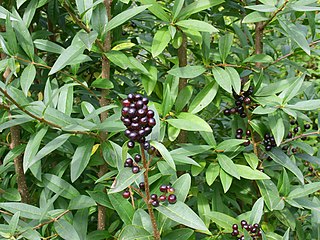
A privet is a flowering plant in the genus Ligustrum. The genus contains about 50 species of erect, deciduous or evergreen shrubs, sometimes forming small or medium-sized trees, native to Europe, north Africa, Asia, many introduced and naturalised in Australasia, where only one species, Ligustrum australianum, extends as a native into Queensland. Some species have become widely naturalized or invasive where introduced. Privet was originally the name for the European semi-evergreen shrub Ligustrum vulgare, and later also for the more reliably evergreen Ligustrum ovalifolium and its hybrid Ligustrum × ibolium used extensively for privacy hedging, though now the name is applied to all members of the genus. The generic name was applied by Pliny the Elder to L. vulgare. It is often suggested that the name privet is related to private, but the OED states that there is no evidence to support this.

Cypripedium is a genus of 58 species and nothospecies of hardy orchids; it is one of five genera that together compose the subfamily of lady's slipper orchids (Cypripedioideae). They are widespread across much of the Northern Hemisphere, including most of Europe and Africa (Algeria), Russia, China, Central Asia, Canada the United States, Mexico, and Central America. They are most commonly known as slipper orchids, lady's slipper orchids, or ladyslippers; other common names include moccasin flower, camel's foot, squirrel foot, steeple cap, Venus' shoes, and whippoorwill shoe. An abbreviation used in trade journals is "Cyp." The genus name is derived from Ancient Greek Κύπρις (Kúpris), an early reference in Greek myth to Aphrodite, and πέδιλον (pédilon), meaning "sandal".

Calypso is a genus of orchids containing one species, Calypso bulbosa, known as the calypso orchid, fairy slipper or Venus's slipper. It is a perennial member of the orchid family found in undisturbed northern and montane forests. It has a small pink, purple, pinkish-purple, or red flower accented with a white lip, darker purple spottings, and yellow beard. The genus Calypso takes its name from the Greek signifying concealment, as they tend to favor sheltered areas on conifer forest floors. The specific epithet, bulbosa, refers to the bulb-like corms.
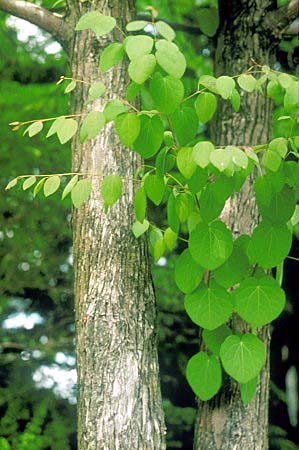
Cercidiphyllum is a genus containing two species of plants, both commonly called katsura. They are the sole members of the monotypic family Cercidiphyllaceae. The genus is native to Japan and China and unrelated to Cercis (redbuds).

Acer japonicum, fullmoon maple, or downy Japanese-maple, is a species of maple native to Japan, on Honshū, Hokkaidō, Kyūshū, and also southern Korea.

Ligustrum japonicum, known as wax-leaf privet or Japanese privet is a species of Ligustrum (privet) native to central and southern Japan and Korea. It is widely cultivated in other regions, and is naturalized in California and in the southeastern United States from Texas to Virginia.

Styphnolobium japonicum, the Japanese pagoda tree is a species of tree in the subfamily Faboideae of the pea family Fabaceae.
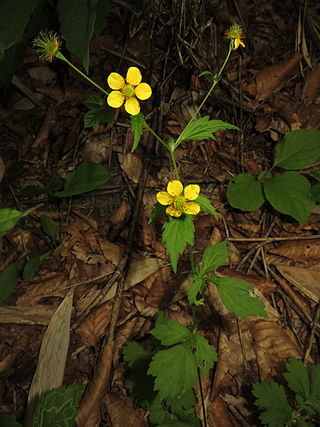
Geum japonicum, known as Asian herb bennet, is a yellow-flowering perennial plant native to North America and East Asia, especially Japan. It may be synonymous with Geum macrophyllum, the North American flower. As a traditional herbal remedy it is known as an astringent and used in poultices. However, in recent years, the Thunberg variant has received attention for other possible medical uses.

Eupatorium japonicum, known as fragrant eupatorium in English and 白头婆 bai tou po, in Chinese, is a herbaceous plant species in the family Asteraceae. It is native to China, Japan and Korea.

Cercidiphyllum japonicum, known as the Katsura, is a species of flowering tree in the family Cercidiphyllaceae native to China and Japan. It is sometimes called caramel tree for the light caramel smell it emits during leaf fall.

Cypripedium guttatum, the spotted lady's slipper or Alaskan lady's slipper, is a species of orchid found on three continents. Each stem has about two clasping leaves that alternate. The plant has a height of 12 centimeters to 35 centimeters. The magenta and white colored labellum is pitcher shaped.

Cypripedium macranthos, the large-flowered cypripedium, is a species of orchid. It is native to Belarus, Russia, Mongolia, Japan, Korea, Taiwan and China.

Thrixspermum japonicum, known as East Asian thrixspermum, is a species of orchid native to Korea, south-central and southern Japan, and parts of China.

Cypripedium calceolus is a lady's-slipper orchid, and the type species of the genus Cypripedium. It is native to Europe and Asia.
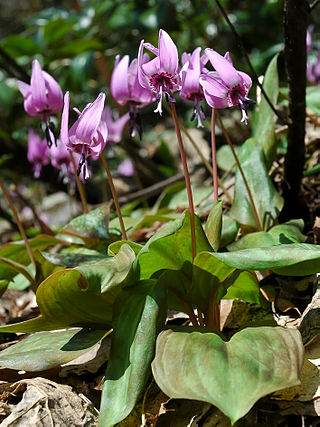
Erythronium japonicum, known as Asian fawn lily, Oriental fawn lily, Japanese fawn lily is a pink-flowered species trout lily, belonging to the Lily family and native to Japan, Korea, the Russian Far East and northeastern China. It is a spring ephemeral, blooming April–June in woodlands. It is known as zhūyáhuā (猪牙花) in Chinese, eolleji (얼레지) in Korean, and katakuri in Japanese.

Tonogayato Garden is a traditional Japanese garden located in Kokubunji, Tokyo. Its name comes from the region's old name, Tonogayato, Kokubunji village. The garden covers an area of 21,124 square metres.
E. japonicum may refer to:

Lygodium japonicum is a species of fern that is known by the common names vine-like fern and Japanese climbing fern. It is native to eastern Asia, including Taiwan, Japan, Korea, southeastern Asia, and India, and eastern Australia. The fern is present in the southeastern United States and Puerto Rico as an introduced species.
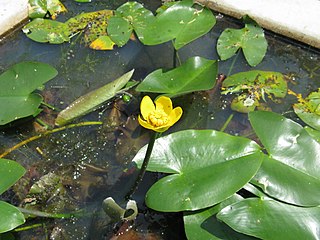
Nuphar japonica, known as East Asian yellow water-lily, is an aquatic plant species in the genus Nuphar found in Japan and the Korean Peninsula. It is endangered in Russia. The species was not accepted by The Plant List as of November 2013, which regarded it as an "unresolved name".

Peucedanum japonicum, also known as coastal hog fennel, is a species of Peucedanum, a genus rich in medicinal species belonging to the parsley family, Apiaceae.




















